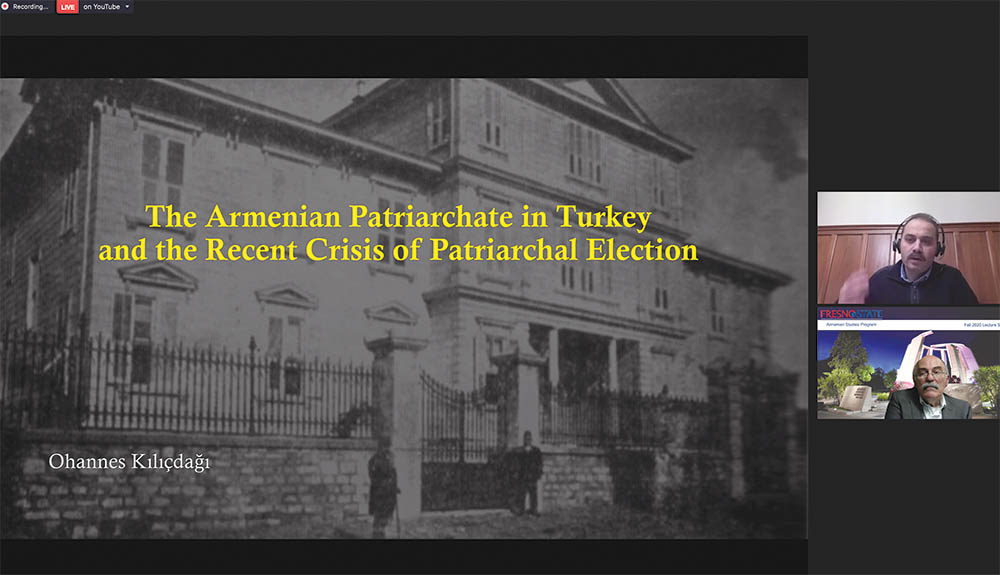
Dustin Vartanian
Staff Writer
“There remained no legal document that defines the Patriarch and specifies the rights and responsibilities of the Patriarch and also specifying the rules of Patriarchal elections. This would become problematic in future elections for the Patriarch of Istanbul. When elections get complicated, there are no set processes and the Turkish government exerts great influence,” stated guest speaker Dr. Ohannes Kılıçdağı.
This was the main topic of discussion for Dr. Kılıçdağı’s presentation “The Armenian Patriarchate of Istanbul Under the Light of the Last Crisis of the Patriarchal Election,” which took place on Friday, November 16, and was the third and final lecture Dr. Kılıçdağı gave during the Fall semester.
The presentation was part of the Armenian Studies Program Fall Lecture Series.
Dr. Kılıçdağı began with the interesting history of the Armenian Patriarchate of Istanbul. When the 1863 Armenian Constitution was adopted, the Patriarchate’s authority was reduced as the National Assembly played a larger role in the Armenian community.
However, Sultan Abdul Hamid II abrogated the Ottoman Constitution, and also the Armenian Constitution, which placed the Patriarch back at the head of the Armenian community.
It was not until the Ottoman Revolution of 1908 that the Armenian Constitution again took affect and the authority of the Patriarch was once again diminished. However, Dr. Kılıçdağı stated that this diminished authority did not make the role of the Patriarch unimportant.
“The Patriarch in the capital and the Prelacies in the provinces were still important interrogators of Turkish politicians and bureaucrats,” asserted Dr. Kılıçdağı.
Furthermore, today the title “Patriarch” does not legally exist in Turkey but the Patriarch is still perceived to be the representative of the Armenian community.
Dr. Kılıçdağı then turned to the topic of the recent crisis in the Patriarch of Istanbul in 2006, which arose from Patriarch Mesrop Mutafyan’s illness that unfortunately left him in a coma for a number of years. Patriarch Mutafyan was elected Patriarch in 1998, but withdrew from all duties in 2008.
Archbishop Aram Ateşyan sought to establish a “co-patriarch” and the initiator committee wanted to elect a new Patriarch so they could handle the responsibilities of Patriarch Mutafyan, who was no longer able to carry out his duties. However, the Turkish government decided to create the position of “general deputy” to which Archbishop Ateşyan was elected by the religious council.
However, others involved in Patriarchal affairs wished to elect a locum tenens which would take place of the general deputy. Tensions arose in the Armenian community as elections were organized to replace Archbishop Ateşyan but the Turkish Government refused to recognize it. As a result, Archbishop Ateşyan remained in his position until the election of the new Patriarch.
Dr. Kılıçdağı concluded his presentation by explaining how the absence of election processes and the control of the Turkish government created strong internal tensions within the Armenian community.
“We saw once in this election that the absence of a permanent legal document defining the Patriarchate and organizing the election create arbitrariness and how this arbitrariness erodes the Armenian community,” stated Dr. Kılıçdağı.
He referred to the role the Turkish government played during the Patriarchal elections saying that “members of the Armenian community are actors of a stage but set by the Turkish state.”
Throughout all of the conflict and tension aroused in the past few years, the role of the Patriarch no longer enjoys as much authority as before. Dr. Kılıçdağı stated that the role of the Patriarch “…is a matter of prestige because of the same reasons since there was no prominent legal rules and regulations defining the limits of authority, the authority and influence of patriarch and patriarchate depends on the influence and the prestige he has amongst the members of the community.”
This is an intriguing thought to walk away with at the conclusion of this lecture.
 Hye Sharzhoom Armenian Action
Hye Sharzhoom Armenian Action